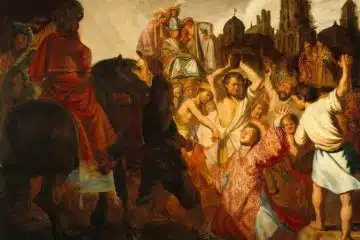Sunday Scripture: The lessons of baptism
January 5, 2011
By Timothy P. Schehr
Baptism of the Lord: Isaiah 42:1-7; Acts 10:34-38;Matthew 3:13-17
Many of us have no memory of baptism. We see it only infaded photographs taken by proud parents or other family members. But thisfeast of the Baptism of the Lord offers us the chance to put new energy intothe meaning of baptism. Let’s review the readings and see what lessons we candiscover.
As we listen to the Gospel we may be surprised to learnthat the baptism of Jesus almost did not happen. John tried to prevent Jesusfrom stepping forward. We can almost see John putting up his hand in protest.He had done the same thing to the Pharisees when they stepped forward. Hecalled them a brood of vipers and challenged them to give some sign of repentance.But that cannot be the reason here. We don’t have to wait long for an answer.John feels unworthy; he argues that Jesus should be the one baptizing him. Andin this response from John the Baptist we get our first lesson. It has to dowith humility. We put ourselves aside to give all the attention to God.
This is the big connecting point between the reading fromIsaiah and the Gospel reading. In this first of four celebrated Servant Songsin Isaiah’s book, the prophet introduces the servant of the Lord to hisreaders. In the first reading God is very pleased with the servant and, in theGospel, a voice from heaven declares that God is very pleased with Jesus. Themessage is clear enough: Jesus is the suffering servant the prophet Isaiahannounced would one day come to accomplish great things for God.
The servant works by example more than loud proclamation.He does not raise his voice in the streets but gets his message across quietly.Jesus seems to act in the same way. We might think of the times when Jesus tookpeople aside away from the crowd to heal them and invite them to deeper faith.
Isaiah tells us what the servant will accomplish. He willgive sight to the blind, set prisoners free and be a light to a people walkingin darkness. All of these wonderful deeds are fulfilled in Jesus who opened theeyes of the blind, freed people from the grasp of evil and enlightened theworld with His life-giving message. The challenge is for us who are baptized inthe Lord to do all we can to imitate the Lord.
Another lesson for the baptized comes with the Lord’sresponse when He tells John to go along with it “for now” because itfulfills God’s plan of salvation. God’s plans should come first. Our words andactions should contribute to the journey of faith.
When Jesus emerges from the waters of the Jordan River,the heavens open for Him. This is something special in the Bible. It does nothappen very often. St. Stephen saw the heavens this way as he was about tosurrender his life for giving witness to the Lord. In his Book of RevelationJohn is privileged to see the court of heaven giving constant praise to God. Inboth cases the boundary between heaven and earth vanishes to accent God’sconnectedness with us. This is most apparent in Jesus. Little wonder that theheavens open as He receives the baptism of John to begin His public ministry.As we think about the meaning of baptism for us, we might ask God to give usthe grace to say and do such things that the boundary between heaven and earthseems imperceptible to those around us.
In the second reading Paul gives the household of thefaithful Cornelius a very tidy summary of the work of Jesus that sets a fineexample for us. “He went about doing good…for God was with Him.”
Father Schehr is a faculty member at the Athenaeum ofOhio.













